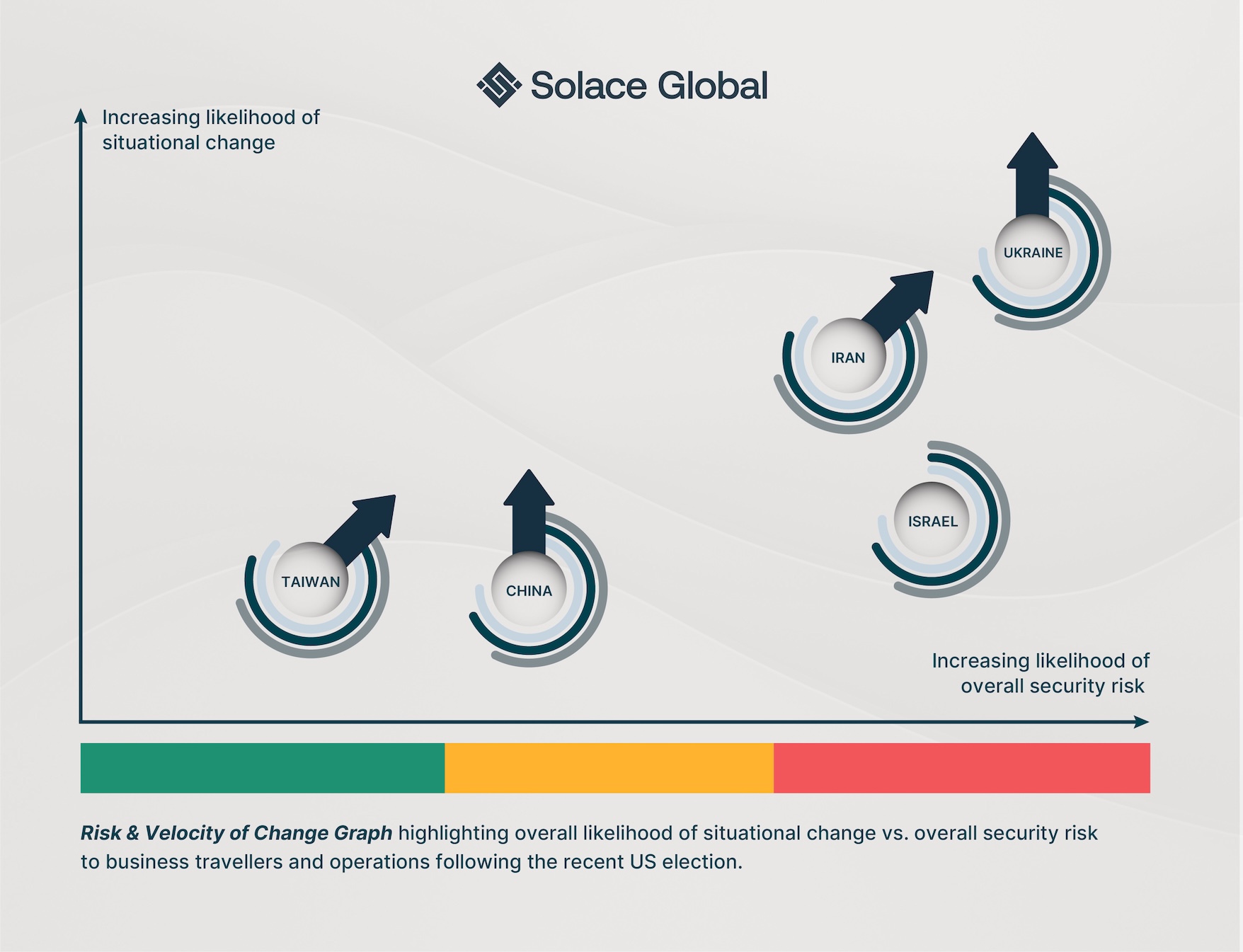What Trump’s Foreign Policy Means for Global Stability in 2025

America First and Beyond: Trump’s Core Foreign Policy Trends
Following his 2024 US Presidential Election victory, President-elect Donald Trump is set to be inaugurated on 20 January 2025. The incoming Trump administration’s foreign policy agenda and outlook will highly likely depart from the status quo established by the Biden administration since 2020, posing profound questions on what a Trump administration could mean for international security.
Trump’s Foreign Policy Strategy: Key Themes and Contradictions
Donald Trump’s foreign policy platform can be broadly categorised as having four distinct, at times interlinked and at other times contradictory, trends:
- America First Isolationism: Trump has at times argued for a greater level of US isolationism, that is to say, a policy of prioritising the domestic needs of the US by reducing the costs and responsibility of the US policy of interventionism which has been ascendant since World War II.
- Selective Hawkishness: In contrast to the trend of isolationism, Trump has selectively advocated for and adopted a more hawkish (aggressive foreign policy that is more militaristic and interventionist) approach to specific international challenges, namely Iran.
- Transactional Diplomacy: Due to the US’ highly significant role as the preeminent power in the international order, Trump has previously sought to leverage overreliance on US-provided security guarantees and power to gain transactional benefits and compel compliance.
- Unpredictability: Trump’s foreign policy has been defined by its unpredictability, with Trump previously having appointed a diverse team of advisors and officials with contradictory foreign policy platforms. On the one hand, this can add an element of deterrence, as hostile states and actors are less able to predict how a Trump administration will retaliate and may therefore opt for caution. On the other hand, this unpredictability can cause great concern in allies and potentially embolden hostile states and actors to make riskier and more escalatory decisions.

Risk & Velocity of Change Graph highlighting overall likelihood of situational change vs. overall security risk to business travellers and operations following the recent US election.
Donald Trump will be faced with numerous foreign policy challenges once he returns to the White House. The most significant of these are as follows:
How Trump’s Return Could Impact the Future of NATO
Trump has said he will “reassess” the US’ role in NATO, stating in 2020 that “NATO is dead” and consistently threatening to abandon NATO.
In Trump’s previous administration, Trump’s key point of contention was the failure of multiple NATO members to reach the agreed 2 per cent of GDP spending commitment on defence. However, since Russia’s 2022 full-scale invasion of Ukraine, numerous NATO members (and new members such as Sweden and Finland) have drastically increased their defence spending.
Nonetheless, there is a realistic possibility that as part of an America First isolationist agenda, Trump could pursue the reduction of US troop deployments, having previously made the deal for the US withdrawal from Afghanistan.
In Europe, it is likely that the unpredictability of Trump’s foreign policy has raised substantial concerns regarding the reliability of US security guarantees and support, which may embolden hostile actors such as Russia to pursue even more aggressive actions against European NATO members, particularly in Eastern Europe.
How Trump’s Stance on Military Aid Could Affect Ukraine
Trump has claimed he would end the war in Ukraine “within 24 hours” if he regained the presidency. Due to Trump’s repeated threats to stop US military aid to Ukraine, efforts have been made to “Trump-proof” Ukraine aid, with pledged future commitments and NATO taking over from the US in coordinating military aid to Ukraine.
However, it is highly likely that if determined, Trump will be able to significantly reduce levels of US support for Ukraine, particularly if the Republicans control both Congress and the Senate. An essential centre of gravity (COG) for Ukraine in resisting Russia’s invasion, i.e. a key source of a country’s strength and strategic capability in a conflict, is international military aid, of which the US is by far the greatest contributor.
It is unlikely that European partners will be able to entirely make up for any significant decrease in US aid, therefore the incoming Trump presidency poses an existential threat to the territorial integrity of Ukraine. Russia is likely to take advantage of any shortcomings in aid to Ukraine, with previous delays in US aid leading to air defence interceptor shortages that were exploited by Russia to successfully strike critical national infrastructure (CNI).
A substantial reduction or full withdrawal of US aid could force Kyiv to accept greater concessions in any future hypothetical peace negotiations.
Trade War 2.0? How Trump’s Return Could Affect China-US Trade
During his previous presidency, the Trump administration imposed significant tariffs on imported Chinese goods, a policy which was maintained and even expanded by Biden’s administration. As part of Trump’s broader ‘America First’ policy platform, Trump almost certainly seeks to focus his China foreign policy on economic issues and trade, adopting a protectionist disposition that seeks to boost and protect domestic industries by taxing imports.
Trump has even proposed measures such as tripling the already high tariffs on hundreds of billions of dollars’ worth of Chinese goods. It is likely that the incoming Trump administration will seek to revitalise the “trade war” that the previous Trump administration pursued with China.
It is likely, however, that while perhaps deploying a more “fiery rhetoric” against China, Trump-led antagonism with China will be primarily limited to economic issues, though Trump may seek to leverage other issues such as Asian-Pacific regional security as a tool to reach his economic goals.
Trump’s Taiwan Policy: Defense Guarantees vs. Economic Interests
Trump’s attitude to the Taiwan question has been highly variable, with two distinct and contradictory currents. Trump has firstly pursued a greater level of support for Taiwan, and in 2016 was the first US President or President-elect to directly speak with Taiwan’s President since 1979. Trump’s previous administration increased US Navy patrols in the Taiwan Strait, and Trump has advocated for further arms sales to Taiwan.
Secondly, however, Trump has been highly critical of the Taiwan Semiconductor Manufacturing Company’s (TSMC) monopoly on the production of advanced semiconductors and Trump’s comments in July 2024, that Taiwan should pay for its own defence, sparked concern regarding the reliability of US defence guarantees under a Trump administration.
It is likely that this is an example of Trump’s transactional diplomacy, seeking to leverage Taiwan’s reliance on US defence guarantees to enable a greater level of semiconductor manufacturing in the US. Trump’s unpredictability and isolationist tendencies, however, could embolden Beijing to take greater risks towards Taiwan.
Potential Shifts in US Policy Toward Israel Under Trump
Trump is staunchly pro-Israel, which appeals to his key evangelical Christian support base. Trump’s previous administration formally recognised Jerusalem as Israel’s capital city and asserted Israeli sovereignty over the contested Golan Heights. Trump has repeatedly indicated opposition to a two-state solution and an independent Palestinian state.
While the Abraham Accords mediated by Trump’s previous administration led to normalisation deals between Israel and several Arab states (such as the United Arab Emirates and Bahrain), further negotiations for normalisation with Saudi Arabia, for example, have been placed on hold as a result of the ongoing conflict in Gaza.
It is likely that a Trump administration will offer an even greater level of support and freedom of action to Israel as it prosecutes wars against its various adversaries. Alternatively, however, there is a realistic possibility that Trump will seek to be seen as a ‘peacemaker’ in the Middle East.
Could Trump’s Policies Escalate the Conflict with Iran?
Despite the current of America First isolationism, Trump has been distinctly hawkish in regard to Iran. The previous Trump administration withdrew from the “Iran nuclear deal” in 2018, reimposing sanctions against Iran, and in 2020, the Trump administration presided over the targeted killing of the Islamic Revolutionary Guard Corps (IRGC) Quds Force commander Qasem Soleimani, a highly influential figure who was arguably the second most powerful man in Iran, behind Ayatollah Ali Khamenei.
With tensions at a generational high in the Middle East currently, and the threat of further escalation in conflict between Israel and Iran, the Biden administration has recently sought to urge caution and restraint from all actors. Trump’s new presidency could pursue a much more aggressive foreign policy posture towards Iran, and the relatively new president of Iran Masoud Pezeshkian will likely struggle to pursue his elected mandate of reopening nuclear negotiations with the US more under Trump than if Kamala Harris had been elected.
Moreover, there is a realistic possibility that Trump will escalate the military campaign Operation Prosperity Guardian against the Houthis in Yemen, which while having had an impact in degrading Houthi capabilities, has failed to entirely stop Houthi attacks against merchant shipping in the Red Sea and Gulf of Aden.
SECURE YOUR JOURNEY
Tailored Security Solutions for International Engagements
For those conducting business or engaging in diplomatic and strategic missions in potentially volatile regions, Solace Global Risk facilitate safer travel for corporate travellers, executives and private clients, with travel risk assessments and end-to-end secure journey management.
Security solutions include intelligence and advisory, latest security alerts through Solace Secure, security trained drivers and airport meet and greet.
